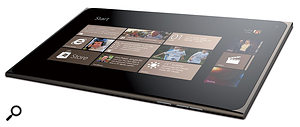Early adopters of the Microsoft Surface could be frustrated by cut-down software and uncertain support from third-party app developers.
 Microsoft's Surface is slim, stylish, and coming soon to a store near you, but we'll have to wait and see if it provides serious competition for Apple's iPad.
Microsoft's Surface is slim, stylish, and coming soon to a store near you, but we'll have to wait and see if it provides serious competition for Apple's iPad.
Initial sales of Microsoft's Surface touch tablet in its Nvidia ARM-based 64 and 32 GB incarnations are said to have been "disappointing” since its October launch. However, as I write this a few days before Christmas, production is apparently being ramped up to meet fresh demand now that Microsoft have abandoned their initial direct sales approach (online via their web site and a small clutch of dedicated retail stores across the US and Canada) in favour of enlisting a network of existing retailers including John Lewis, Dixons and Staples. The Surface is already sitting alongside similarly priced iPads in plenty of shops (which may or may not help), but should be appearing in many more during 2013 once this sales network expands and matures.
Doubts Surface
It will be very interesting to see how Surface sales pan out over the Christmas period. It won't surprise me if some mainstream users make a purchase without appreciating that while their new Surface touch tablet is bundled with Office Home & Student 2013 RT, this cut-down operating system won't run any of the traditional Windows applications and games that they may already own. iPad owners may be up to speed, but this is a whole new ball game for the PC consumer! We shall also have to wait and see what long-term app support Windows 8 RT gets from third-party developers. This is a bit of a chicken-and-egg situation, since until there are plenty of RT-enabled devices in the field there won't be a lucrative market for the associated apps. At least Apple have prepared the market by making us all well aware that apps are colourful, useful, and generally as cheap as chips!
The situation will change again during 2013 as Microsoft's more upmarket Surface models appear with Intel CPUs, and running the full Windows 8 Pro operating system. These, I suspect will be of more interest to the musician, as they will run our favourite sequencers, soft synths and plug-ins, but they will in turn face more competition from the latest touchscreen Ultrabook format which is already being priced keenly by Intel and other hardware manufacturers. Dell have also officially given up making Android phones and tablets in favour of hardware running Windows 8 or RT. If you're still at all confused, there's loads more info online at the Microsoft Store (http://surface.microsoftstore.com).
A Touchy Subject
Meanwhile, Windows 8 itself is still attracting a lot of controversy. Microsoft believe that the vast majority of computers will have touchscreens in the future, but until that happens there is bound to be some confusion and frustration among users. There are now a huge number of Windows 8-powered devices on sale, but still very few with touchscreens, so I'm still half-expecting a backlash from some consumers when they realise that their shiny new touch-based interface is somewhat redundant without a touchscreen.
Microsoft have been collecting data on user reaction via their "customer experience improvement program”, and you can join in too, as all Windows 8 users have the option to enroll in that program when they first log into the new operating system. Shorter-term research studies by third parties suggests that the first few hours can be very disappointing for new users, and the anonymous data collected so far by Microsoft suggests that users typically take between two days and two weeks to fully adjust to the radically new features. As I said in this very column a few months ago, give it a fair chance before throwing up your hands in horror.
In the longer term it's inevitable that, as a budget PC today can deliver the same performance as a cutting-edge model from a few years ago, a significant proportion of mainstream users simply won't see the need to upgrade their current machines for some time. And, when they do, they will be looking for bargains rather than upmarket options. Ironically, Microsoft may be hastening this scenario by encouraging a proportion of these customers to move over to the less powerful Windows 8 RT tablet format. As a result, the desktop PC format may start to decline, which in turn may push prices up. So, if you're considering an upgrade then now might be a suitable time to take the plunge.
Shake Your Bootsy
Bootsy's free but PC-only plug-ins (http://varietyofsound.wordpress.com/blog) have often put in an appearance in our Mix Rescue features, but he has recently excelled himself with a new release. Thrillseeker XTC is "a contemporary exciter built around a true parallel analogue-style equaliser design”. It looks gorgeous, but more importantly does a great job of adding subtle and not-so-subtle heft and energy to a wide variety of audio material.
Essentially it's three bands of EQ wired in parallel (Low shelving, Mid peaking and Air shelving, each with tunable frequency), with each containing its own saturator to add extra harmonics, thickness and roundness of the 'analogue' variety. This is followed by a global section with a Drive control to alter the internal gain staging for smoother or harder results. Unlike many such devices, this enhancer isn't 'in your face', instead it offers tasteful enhancement that can be varied from barely discernible sweetening for mastering purposes all the way through to radical. Highly recommended!
